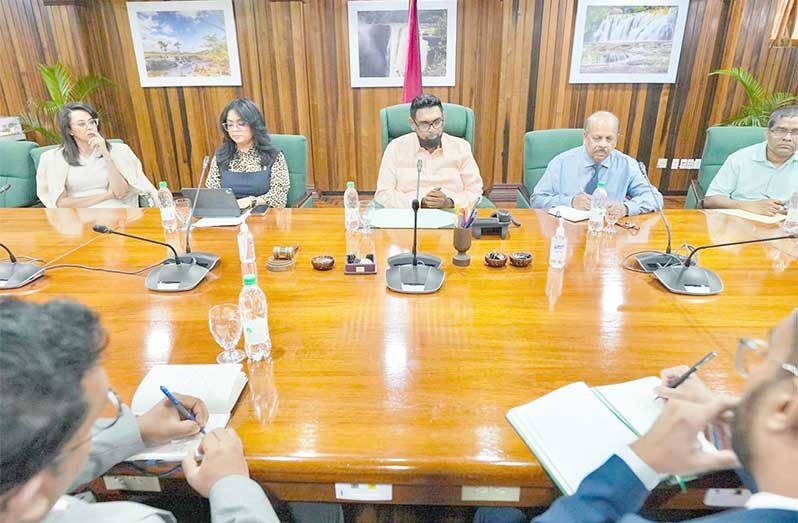–President meets with local banking, private sector to accelerate digitisation efforts
PRESIDENT Dr. Irfaan Ali on Wednesday met with key stakeholders from the financial sector to advance discussions on modernising Guyana’s banking industry and aligning it with the government’s broader digital transformation agenda.
The high-level engagement focused on addressing persistent challenges faced by citizens in accessing financial services and outlined a plan to ensure that commercial banks accelerate their digitalisation efforts in step with government initiatives.
“Today, (Wednesday) I engaged stakeholders from the financial sector to discuss modernising the banking sector to address ongoing concerns citizens face and to discuss plans to ensure commercial banks keep pace with the government in implementing digital transformation,” President Ali stated in a post shared on his official Facebook page.
The stakeholder group, which includes senior representatives from major commercial banks, the Governor of the Bank of Guyana, Dr. Gobind Ganga, Head of the Private Sector Commission, Gerald Gouveia Jr., and other key figures in the financial industry, is expected to submit a comprehensive report in six weeks. The report will outline the sector’s needs and the steps required to realise the government’s vision for a digital economy.
“The stakeholder group is expected to present a report in six weeks outlining what the financial sector requires to realise our vision for a digital economy,” President Ali noted.
The meeting comes at a time when the government is placing increasing emphasis on technology-driven development and enhancing the ease of doing business.
The People’s Progressive Party/ Civic (PPP/C) administration has repeatedly highlighted the importance of digital infrastructure and modernised public and private services in its development strategy.
Recently, Minister in the Office of the President with responsibility for Finance and the Public Service, Dr Ashni Singh, called on Guyana’s banking sector to modernise its approach to lending by taking full advantage of legal reforms that permit the use of movable assets as collateral.
The government has worked diligently to lay the foundation for this fundamental change.
The enactment in 2024 of the Moveable Property Security Act, and the establishment of an Electronic Collateral Registry is a quantum leap.
This legislative development permits a wide variety of moveable property, ranging from equipment and car assets to inventory, receivables, and even intangible property, to be employed as collateral for loans.
This is not just a technical shift; it is a strategic opening of capital to hundreds of thousands of new and existing entrepreneurs and small and medium businesses (SMEs) which possess quality operations assets and not traditional real estate assets which are preferred by banks.
“The banking sector has historically been conservative, erring on the side of caution, which is not necessarily a bad thing,” Dr Singh had said. “We want strong banks and strong balance sheets. We want them to maintain good-quality portfolios. But there is room, I believe, for the banking sector to be more aggressive in providing financing to the Guyanese private sector.”
He noted that this shift in approach is critical, especially in a rapidly growing economy where access to finance remains a constraint for many entrepreneurs and small businesses.
The finance minister had acknowledged that some banks have already begun to adopt these mechanisms, responding to both the legislative framework and the broader economic context. However, he stressed that the pace of adoption has not been fast enough.



.jpg)








